Leadership Personal Reflection Report: Understanding Leadership Skills
VerifiedAdded on 2022/12/12
|11
|3140
|127
Report
AI Summary
This report is a personal reflection on leadership, exploring its definition, key theories, and the impact of leadership on business outcomes. It delves into the author's understanding of leadership, including their strengths in areas such as idealized influence, inspirational motivation, and contingent reward, while also identifying areas for improvement like management by exception. The report covers various aspects of leadership, including behavior theory, path-goal theory, and the influence of organizational culture. It highlights the importance of motivation, effective communication, and the role of leaders in fostering a positive work environment. The author reflects on how they can apply these learnings to enhance their leadership style and decision-making abilities. The report also provides a detailed analysis of the author's understanding of leadership skills, including communication, self-confidence, and management skills.
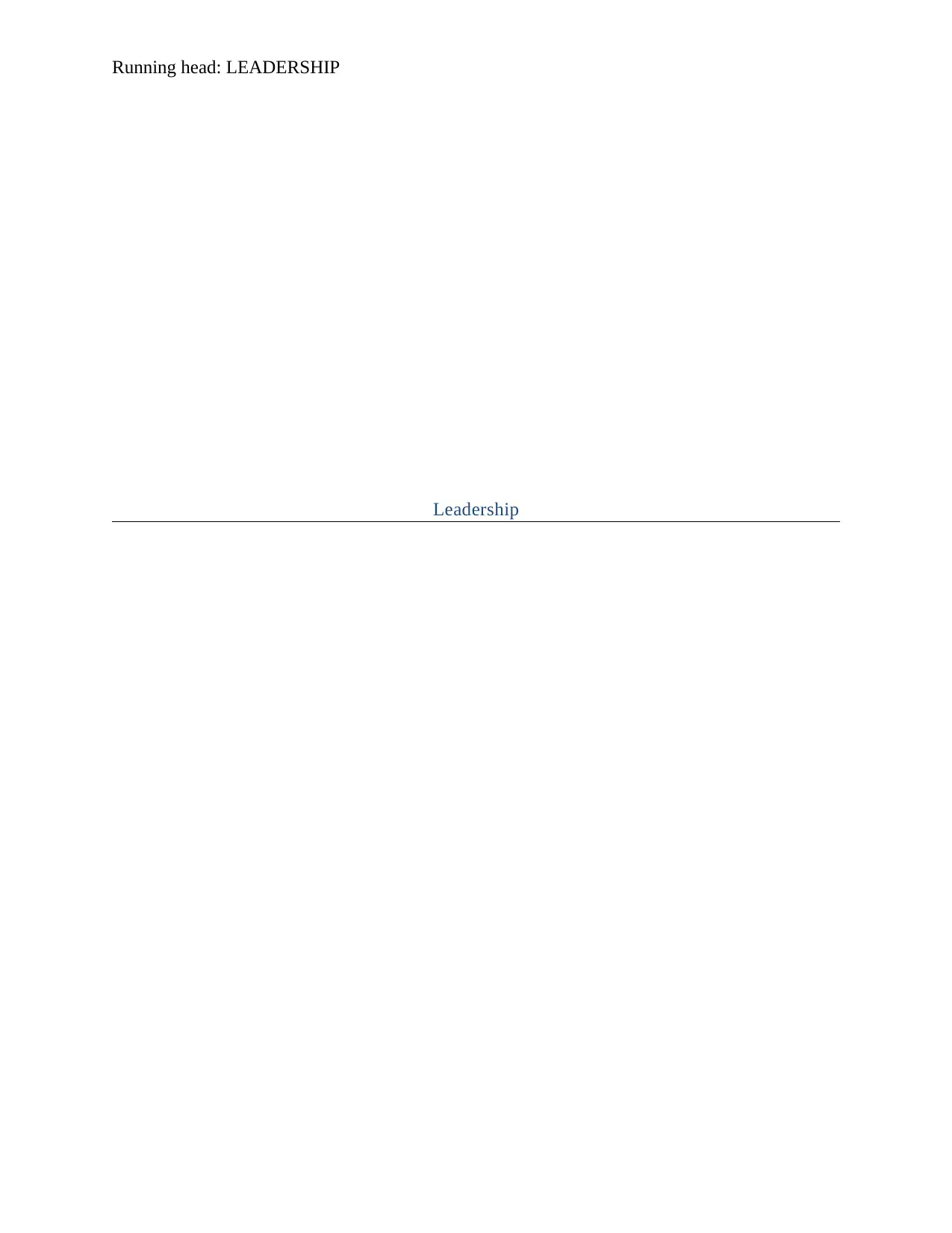
Running head: LEADERSHIP
Leadership
Leadership
Paraphrase This Document
Need a fresh take? Get an instant paraphrase of this document with our AI Paraphraser
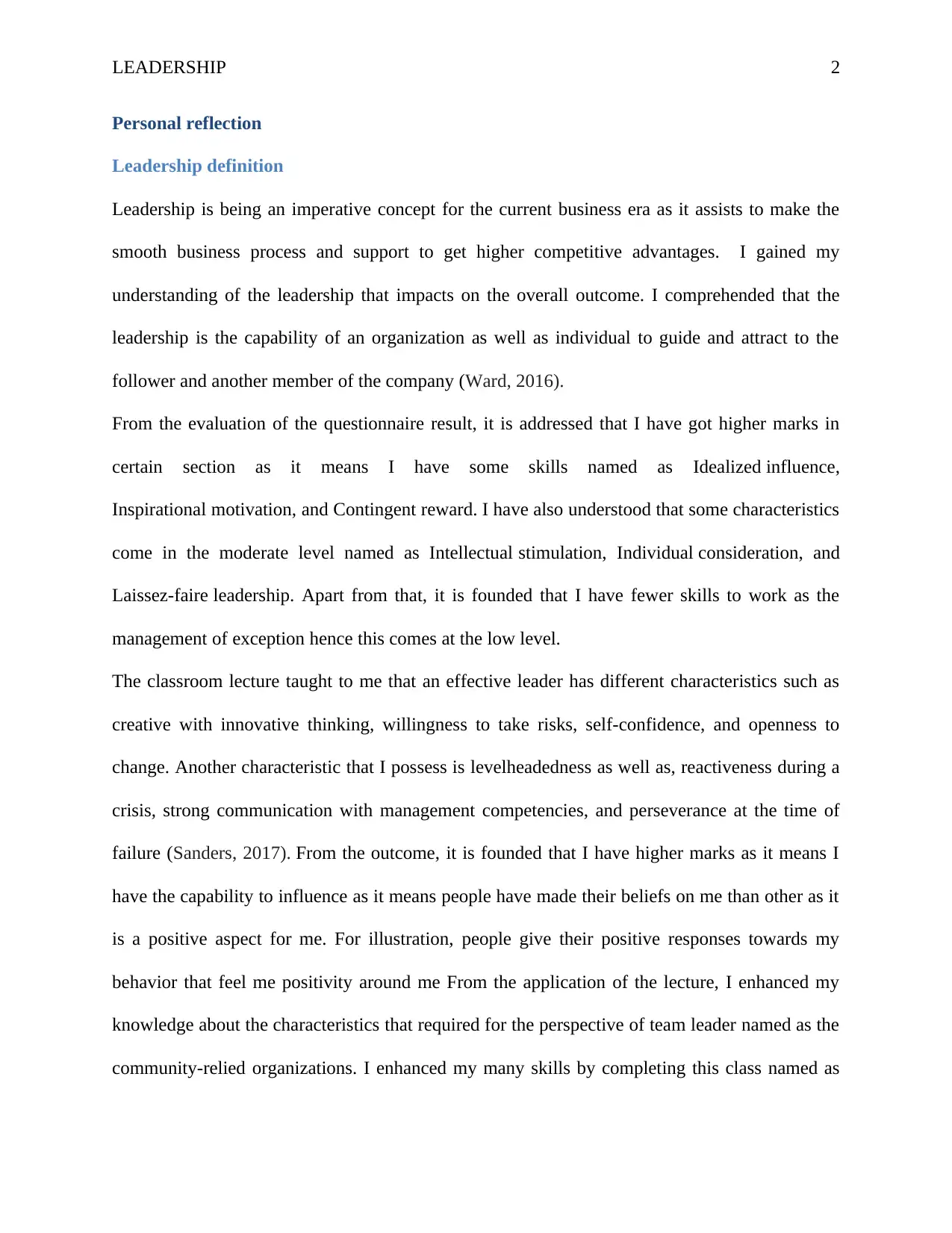
LEADERSHIP 2
Personal reflection
Leadership definition
Leadership is being an imperative concept for the current business era as it assists to make the
smooth business process and support to get higher competitive advantages. I gained my
understanding of the leadership that impacts on the overall outcome. I comprehended that the
leadership is the capability of an organization as well as individual to guide and attract to the
follower and another member of the company (Ward, 2016).
From the evaluation of the questionnaire result, it is addressed that I have got higher marks in
certain section as it means I have some skills named as Idealized influence,
Inspirational motivation, and Contingent reward. I have also understood that some characteristics
come in the moderate level named as Intellectual stimulation, Individual consideration, and
Laissez‐faire leadership. Apart from that, it is founded that I have fewer skills to work as the
management of exception hence this comes at the low level.
The classroom lecture taught to me that an effective leader has different characteristics such as
creative with innovative thinking, willingness to take risks, self-confidence, and openness to
change. Another characteristic that I possess is levelheadedness as well as, reactiveness during a
crisis, strong communication with management competencies, and perseverance at the time of
failure (Sanders, 2017). From the outcome, it is founded that I have higher marks as it means I
have the capability to influence as it means people have made their beliefs on me than other as it
is a positive aspect for me. For illustration, people give their positive responses towards my
behavior that feel me positivity around me From the application of the lecture, I enhanced my
knowledge about the characteristics that required for the perspective of team leader named as the
community-relied organizations. I enhanced my many skills by completing this class named as
Personal reflection
Leadership definition
Leadership is being an imperative concept for the current business era as it assists to make the
smooth business process and support to get higher competitive advantages. I gained my
understanding of the leadership that impacts on the overall outcome. I comprehended that the
leadership is the capability of an organization as well as individual to guide and attract to the
follower and another member of the company (Ward, 2016).
From the evaluation of the questionnaire result, it is addressed that I have got higher marks in
certain section as it means I have some skills named as Idealized influence,
Inspirational motivation, and Contingent reward. I have also understood that some characteristics
come in the moderate level named as Intellectual stimulation, Individual consideration, and
Laissez‐faire leadership. Apart from that, it is founded that I have fewer skills to work as the
management of exception hence this comes at the low level.
The classroom lecture taught to me that an effective leader has different characteristics such as
creative with innovative thinking, willingness to take risks, self-confidence, and openness to
change. Another characteristic that I possess is levelheadedness as well as, reactiveness during a
crisis, strong communication with management competencies, and perseverance at the time of
failure (Sanders, 2017). From the outcome, it is founded that I have higher marks as it means I
have the capability to influence as it means people have made their beliefs on me than other as it
is a positive aspect for me. For illustration, people give their positive responses towards my
behavior that feel me positivity around me From the application of the lecture, I enhanced my
knowledge about the characteristics that required for the perspective of team leader named as the
community-relied organizations. I enhanced my many skills by completing this class named as
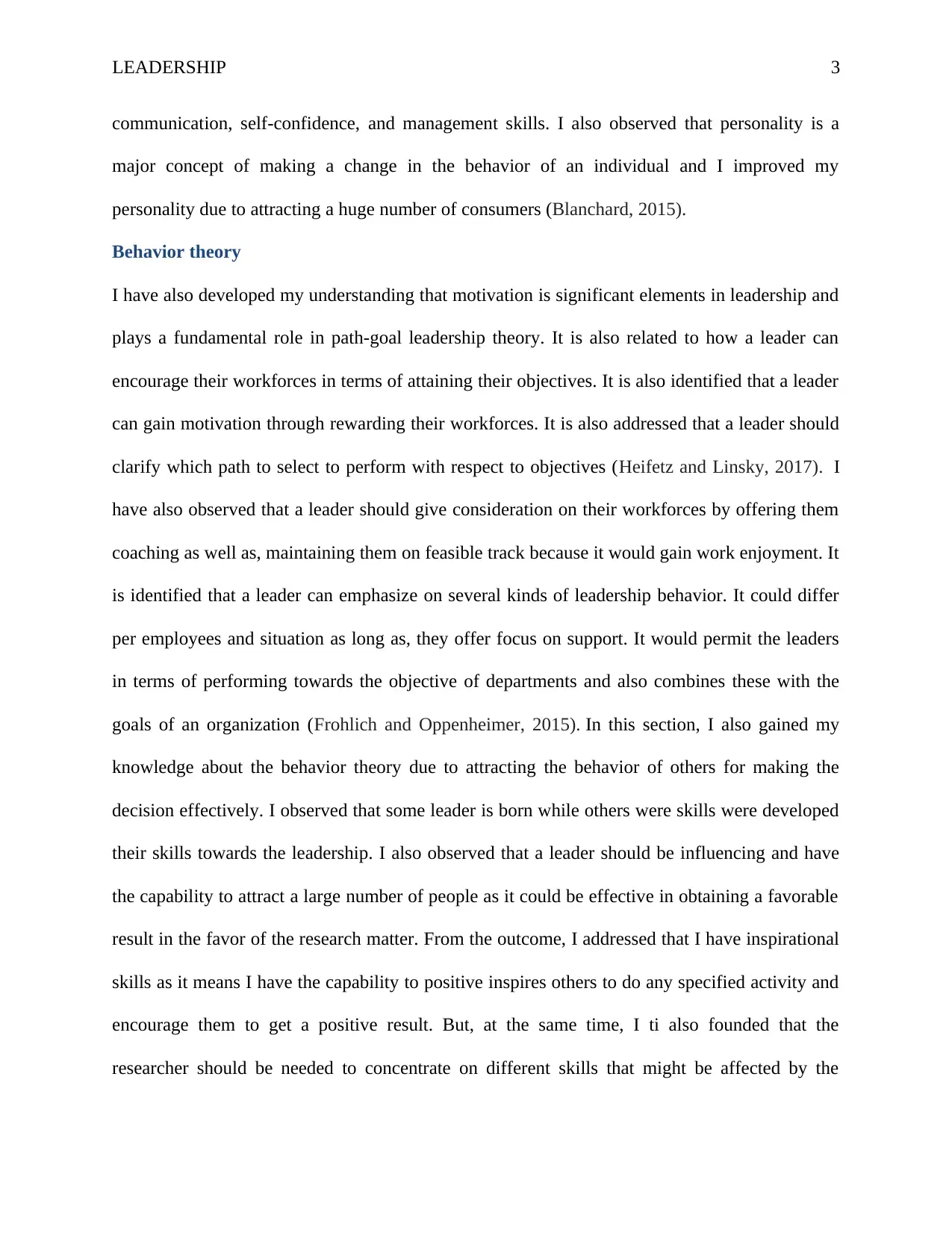
LEADERSHIP 3
communication, self-confidence, and management skills. I also observed that personality is a
major concept of making a change in the behavior of an individual and I improved my
personality due to attracting a huge number of consumers (Blanchard, 2015).
Behavior theory
I have also developed my understanding that motivation is significant elements in leadership and
plays a fundamental role in path-goal leadership theory. It is also related to how a leader can
encourage their workforces in terms of attaining their objectives. It is also identified that a leader
can gain motivation through rewarding their workforces. It is also addressed that a leader should
clarify which path to select to perform with respect to objectives (Heifetz and Linsky, 2017). I
have also observed that a leader should give consideration on their workforces by offering them
coaching as well as, maintaining them on feasible track because it would gain work enjoyment. It
is identified that a leader can emphasize on several kinds of leadership behavior. It could differ
per employees and situation as long as, they offer focus on support. It would permit the leaders
in terms of performing towards the objective of departments and also combines these with the
goals of an organization (Frohlich and Oppenheimer, 2015). In this section, I also gained my
knowledge about the behavior theory due to attracting the behavior of others for making the
decision effectively. I observed that some leader is born while others were skills were developed
their skills towards the leadership. I also observed that a leader should be influencing and have
the capability to attract a large number of people as it could be effective in obtaining a favorable
result in the favor of the research matter. From the outcome, I addressed that I have inspirational
skills as it means I have the capability to positive inspires others to do any specified activity and
encourage them to get a positive result. But, at the same time, I ti also founded that the
researcher should be needed to concentrate on different skills that might be affected by the
communication, self-confidence, and management skills. I also observed that personality is a
major concept of making a change in the behavior of an individual and I improved my
personality due to attracting a huge number of consumers (Blanchard, 2015).
Behavior theory
I have also developed my understanding that motivation is significant elements in leadership and
plays a fundamental role in path-goal leadership theory. It is also related to how a leader can
encourage their workforces in terms of attaining their objectives. It is also identified that a leader
can gain motivation through rewarding their workforces. It is also addressed that a leader should
clarify which path to select to perform with respect to objectives (Heifetz and Linsky, 2017). I
have also observed that a leader should give consideration on their workforces by offering them
coaching as well as, maintaining them on feasible track because it would gain work enjoyment. It
is identified that a leader can emphasize on several kinds of leadership behavior. It could differ
per employees and situation as long as, they offer focus on support. It would permit the leaders
in terms of performing towards the objective of departments and also combines these with the
goals of an organization (Frohlich and Oppenheimer, 2015). In this section, I also gained my
knowledge about the behavior theory due to attracting the behavior of others for making the
decision effectively. I observed that some leader is born while others were skills were developed
their skills towards the leadership. I also observed that a leader should be influencing and have
the capability to attract a large number of people as it could be effective in obtaining a favorable
result in the favor of the research matter. From the outcome, I addressed that I have inspirational
skills as it means I have the capability to positive inspires others to do any specified activity and
encourage them to get a positive result. But, at the same time, I ti also founded that the
researcher should be needed to concentrate on different skills that might be affected by the
⊘ This is a preview!⊘
Do you want full access?
Subscribe today to unlock all pages.

Trusted by 1+ million students worldwide
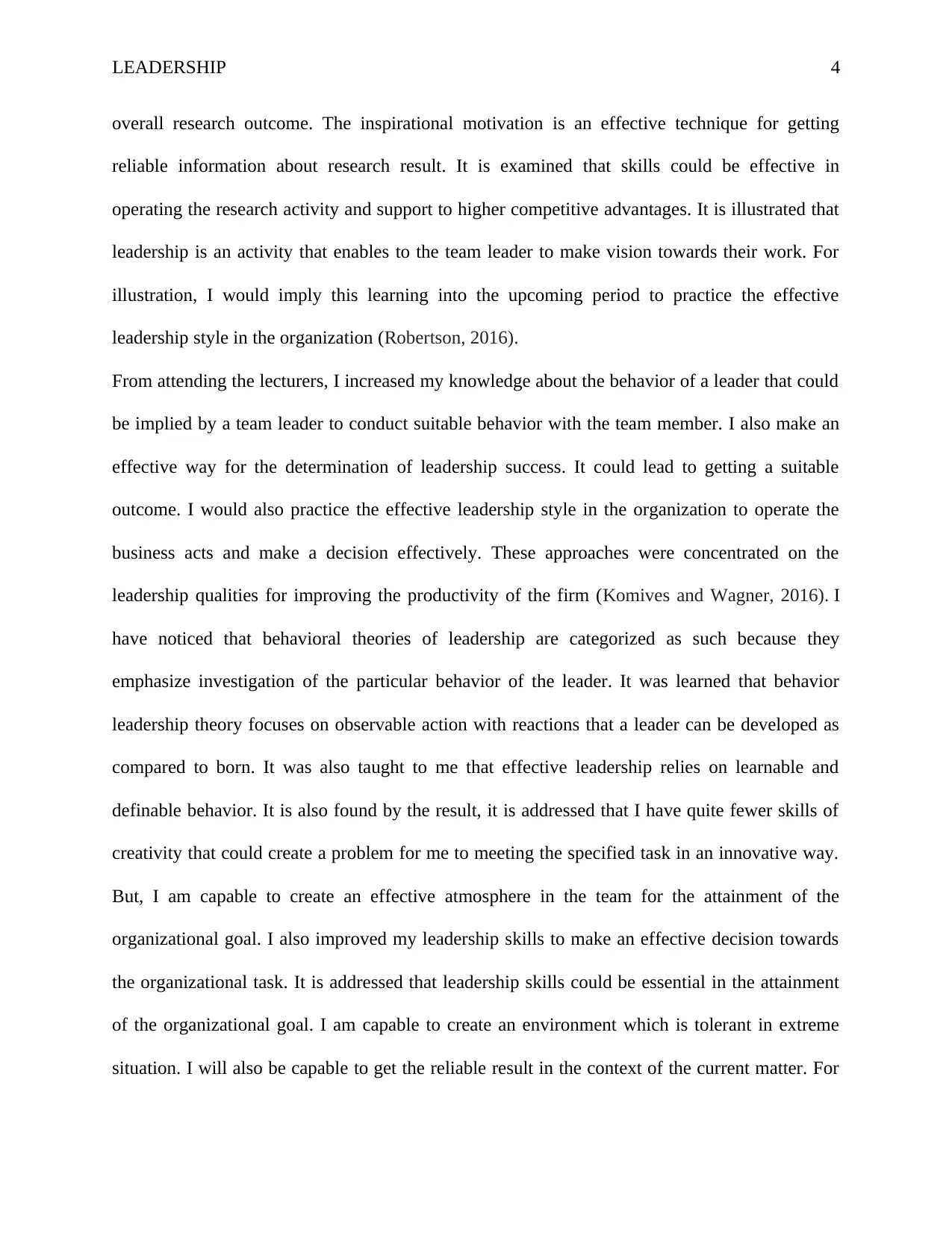
LEADERSHIP 4
overall research outcome. The inspirational motivation is an effective technique for getting
reliable information about research result. It is examined that skills could be effective in
operating the research activity and support to higher competitive advantages. It is illustrated that
leadership is an activity that enables to the team leader to make vision towards their work. For
illustration, I would imply this learning into the upcoming period to practice the effective
leadership style in the organization (Robertson, 2016).
From attending the lecturers, I increased my knowledge about the behavior of a leader that could
be implied by a team leader to conduct suitable behavior with the team member. I also make an
effective way for the determination of leadership success. It could lead to getting a suitable
outcome. I would also practice the effective leadership style in the organization to operate the
business acts and make a decision effectively. These approaches were concentrated on the
leadership qualities for improving the productivity of the firm (Komives and Wagner, 2016). I
have noticed that behavioral theories of leadership are categorized as such because they
emphasize investigation of the particular behavior of the leader. It was learned that behavior
leadership theory focuses on observable action with reactions that a leader can be developed as
compared to born. It was also taught to me that effective leadership relies on learnable and
definable behavior. It is also found by the result, it is addressed that I have quite fewer skills of
creativity that could create a problem for me to meeting the specified task in an innovative way.
But, I am capable to create an effective atmosphere in the team for the attainment of the
organizational goal. I also improved my leadership skills to make an effective decision towards
the organizational task. It is addressed that leadership skills could be essential in the attainment
of the organizational goal. I am capable to create an environment which is tolerant in extreme
situation. I will also be capable to get the reliable result in the context of the current matter. For
overall research outcome. The inspirational motivation is an effective technique for getting
reliable information about research result. It is examined that skills could be effective in
operating the research activity and support to higher competitive advantages. It is illustrated that
leadership is an activity that enables to the team leader to make vision towards their work. For
illustration, I would imply this learning into the upcoming period to practice the effective
leadership style in the organization (Robertson, 2016).
From attending the lecturers, I increased my knowledge about the behavior of a leader that could
be implied by a team leader to conduct suitable behavior with the team member. I also make an
effective way for the determination of leadership success. It could lead to getting a suitable
outcome. I would also practice the effective leadership style in the organization to operate the
business acts and make a decision effectively. These approaches were concentrated on the
leadership qualities for improving the productivity of the firm (Komives and Wagner, 2016). I
have noticed that behavioral theories of leadership are categorized as such because they
emphasize investigation of the particular behavior of the leader. It was learned that behavior
leadership theory focuses on observable action with reactions that a leader can be developed as
compared to born. It was also taught to me that effective leadership relies on learnable and
definable behavior. It is also found by the result, it is addressed that I have quite fewer skills of
creativity that could create a problem for me to meeting the specified task in an innovative way.
But, I am capable to create an effective atmosphere in the team for the attainment of the
organizational goal. I also improved my leadership skills to make an effective decision towards
the organizational task. It is addressed that leadership skills could be essential in the attainment
of the organizational goal. I am capable to create an environment which is tolerant in extreme
situation. I will also be capable to get the reliable result in the context of the current matter. For
Paraphrase This Document
Need a fresh take? Get an instant paraphrase of this document with our AI Paraphraser
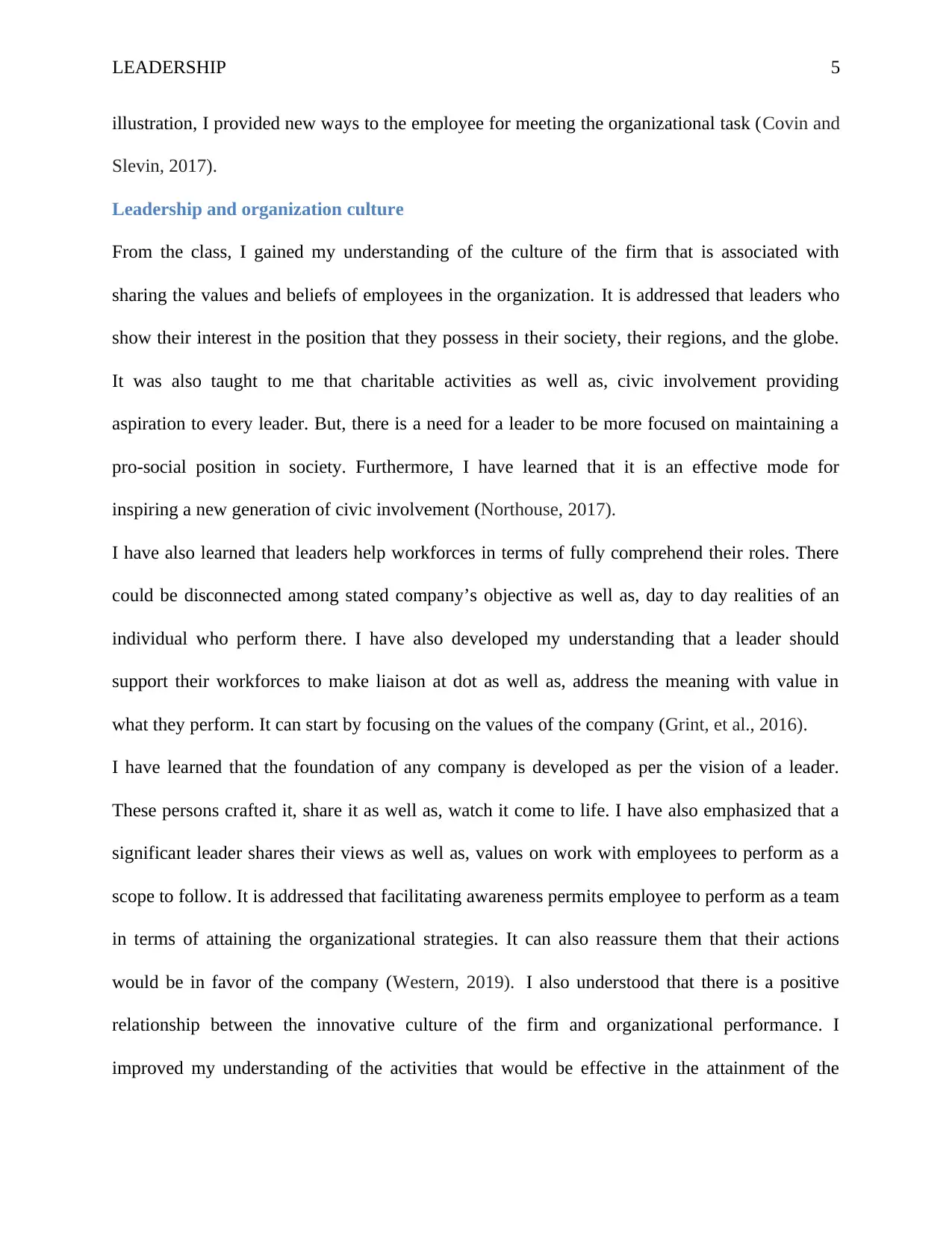
LEADERSHIP 5
illustration, I provided new ways to the employee for meeting the organizational task (Covin and
Slevin, 2017).
Leadership and organization culture
From the class, I gained my understanding of the culture of the firm that is associated with
sharing the values and beliefs of employees in the organization. It is addressed that leaders who
show their interest in the position that they possess in their society, their regions, and the globe.
It was also taught to me that charitable activities as well as, civic involvement providing
aspiration to every leader. But, there is a need for a leader to be more focused on maintaining a
pro-social position in society. Furthermore, I have learned that it is an effective mode for
inspiring a new generation of civic involvement (Northouse, 2017).
I have also learned that leaders help workforces in terms of fully comprehend their roles. There
could be disconnected among stated company’s objective as well as, day to day realities of an
individual who perform there. I have also developed my understanding that a leader should
support their workforces to make liaison at dot as well as, address the meaning with value in
what they perform. It can start by focusing on the values of the company (Grint, et al., 2016).
I have learned that the foundation of any company is developed as per the vision of a leader.
These persons crafted it, share it as well as, watch it come to life. I have also emphasized that a
significant leader shares their views as well as, values on work with employees to perform as a
scope to follow. It is addressed that facilitating awareness permits employee to perform as a team
in terms of attaining the organizational strategies. It can also reassure them that their actions
would be in favor of the company (Western, 2019). I also understood that there is a positive
relationship between the innovative culture of the firm and organizational performance. I
improved my understanding of the activities that would be effective in the attainment of the
illustration, I provided new ways to the employee for meeting the organizational task (Covin and
Slevin, 2017).
Leadership and organization culture
From the class, I gained my understanding of the culture of the firm that is associated with
sharing the values and beliefs of employees in the organization. It is addressed that leaders who
show their interest in the position that they possess in their society, their regions, and the globe.
It was also taught to me that charitable activities as well as, civic involvement providing
aspiration to every leader. But, there is a need for a leader to be more focused on maintaining a
pro-social position in society. Furthermore, I have learned that it is an effective mode for
inspiring a new generation of civic involvement (Northouse, 2017).
I have also learned that leaders help workforces in terms of fully comprehend their roles. There
could be disconnected among stated company’s objective as well as, day to day realities of an
individual who perform there. I have also developed my understanding that a leader should
support their workforces to make liaison at dot as well as, address the meaning with value in
what they perform. It can start by focusing on the values of the company (Grint, et al., 2016).
I have learned that the foundation of any company is developed as per the vision of a leader.
These persons crafted it, share it as well as, watch it come to life. I have also emphasized that a
significant leader shares their views as well as, values on work with employees to perform as a
scope to follow. It is addressed that facilitating awareness permits employee to perform as a team
in terms of attaining the organizational strategies. It can also reassure them that their actions
would be in favor of the company (Western, 2019). I also understood that there is a positive
relationship between the innovative culture of the firm and organizational performance. I
improved my understanding of the activities that would be effective in the attainment of the
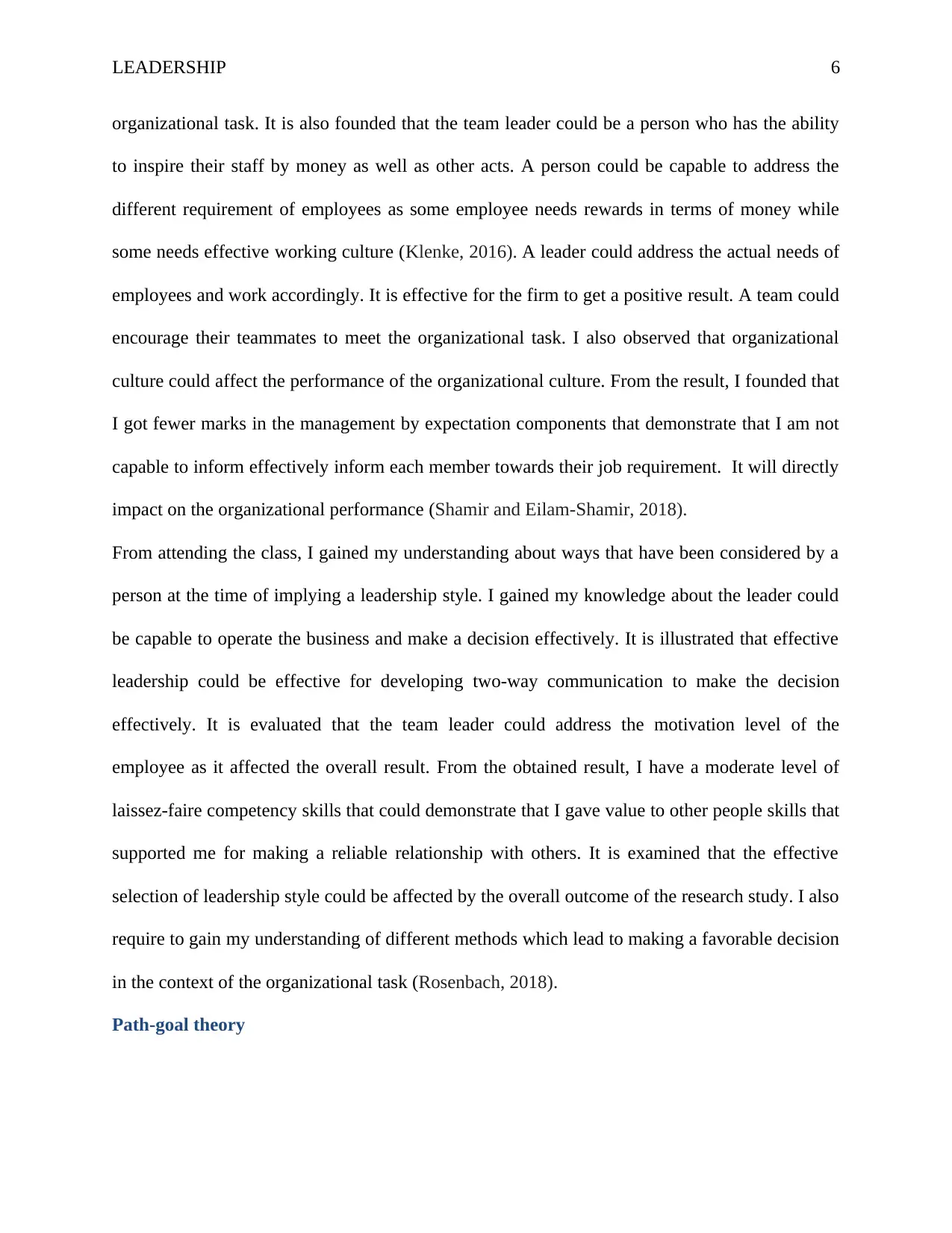
LEADERSHIP 6
organizational task. It is also founded that the team leader could be a person who has the ability
to inspire their staff by money as well as other acts. A person could be capable to address the
different requirement of employees as some employee needs rewards in terms of money while
some needs effective working culture (Klenke, 2016). A leader could address the actual needs of
employees and work accordingly. It is effective for the firm to get a positive result. A team could
encourage their teammates to meet the organizational task. I also observed that organizational
culture could affect the performance of the organizational culture. From the result, I founded that
I got fewer marks in the management by expectation components that demonstrate that I am not
capable to inform effectively inform each member towards their job requirement. It will directly
impact on the organizational performance (Shamir and Eilam-Shamir, 2018).
From attending the class, I gained my understanding about ways that have been considered by a
person at the time of implying a leadership style. I gained my knowledge about the leader could
be capable to operate the business and make a decision effectively. It is illustrated that effective
leadership could be effective for developing two-way communication to make the decision
effectively. It is evaluated that the team leader could address the motivation level of the
employee as it affected the overall result. From the obtained result, I have a moderate level of
laissez‐faire competency skills that could demonstrate that I gave value to other people skills that
supported me for making a reliable relationship with others. It is examined that the effective
selection of leadership style could be affected by the overall outcome of the research study. I also
require to gain my understanding of different methods which lead to making a favorable decision
in the context of the organizational task (Rosenbach, 2018).
Path-goal theory
organizational task. It is also founded that the team leader could be a person who has the ability
to inspire their staff by money as well as other acts. A person could be capable to address the
different requirement of employees as some employee needs rewards in terms of money while
some needs effective working culture (Klenke, 2016). A leader could address the actual needs of
employees and work accordingly. It is effective for the firm to get a positive result. A team could
encourage their teammates to meet the organizational task. I also observed that organizational
culture could affect the performance of the organizational culture. From the result, I founded that
I got fewer marks in the management by expectation components that demonstrate that I am not
capable to inform effectively inform each member towards their job requirement. It will directly
impact on the organizational performance (Shamir and Eilam-Shamir, 2018).
From attending the class, I gained my understanding about ways that have been considered by a
person at the time of implying a leadership style. I gained my knowledge about the leader could
be capable to operate the business and make a decision effectively. It is illustrated that effective
leadership could be effective for developing two-way communication to make the decision
effectively. It is evaluated that the team leader could address the motivation level of the
employee as it affected the overall result. From the obtained result, I have a moderate level of
laissez‐faire competency skills that could demonstrate that I gave value to other people skills that
supported me for making a reliable relationship with others. It is examined that the effective
selection of leadership style could be affected by the overall outcome of the research study. I also
require to gain my understanding of different methods which lead to making a favorable decision
in the context of the organizational task (Rosenbach, 2018).
Path-goal theory
⊘ This is a preview!⊘
Do you want full access?
Subscribe today to unlock all pages.

Trusted by 1+ million students worldwide
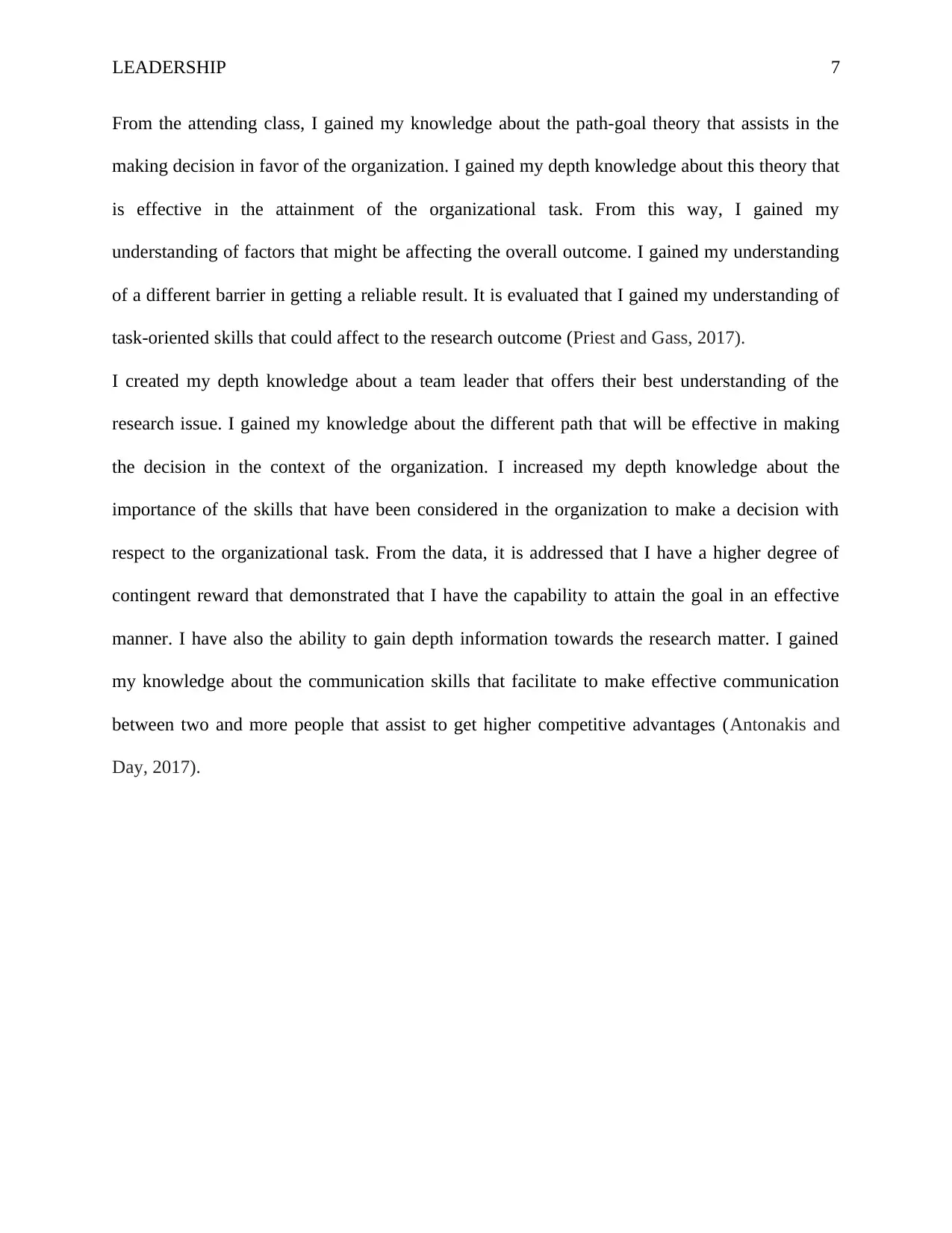
LEADERSHIP 7
From the attending class, I gained my knowledge about the path-goal theory that assists in the
making decision in favor of the organization. I gained my depth knowledge about this theory that
is effective in the attainment of the organizational task. From this way, I gained my
understanding of factors that might be affecting the overall outcome. I gained my understanding
of a different barrier in getting a reliable result. It is evaluated that I gained my understanding of
task-oriented skills that could affect to the research outcome (Priest and Gass, 2017).
I created my depth knowledge about a team leader that offers their best understanding of the
research issue. I gained my knowledge about the different path that will be effective in making
the decision in the context of the organization. I increased my depth knowledge about the
importance of the skills that have been considered in the organization to make a decision with
respect to the organizational task. From the data, it is addressed that I have a higher degree of
contingent reward that demonstrated that I have the capability to attain the goal in an effective
manner. I have also the ability to gain depth information towards the research matter. I gained
my knowledge about the communication skills that facilitate to make effective communication
between two and more people that assist to get higher competitive advantages (Antonakis and
Day, 2017).
From the attending class, I gained my knowledge about the path-goal theory that assists in the
making decision in favor of the organization. I gained my depth knowledge about this theory that
is effective in the attainment of the organizational task. From this way, I gained my
understanding of factors that might be affecting the overall outcome. I gained my understanding
of a different barrier in getting a reliable result. It is evaluated that I gained my understanding of
task-oriented skills that could affect to the research outcome (Priest and Gass, 2017).
I created my depth knowledge about a team leader that offers their best understanding of the
research issue. I gained my knowledge about the different path that will be effective in making
the decision in the context of the organization. I increased my depth knowledge about the
importance of the skills that have been considered in the organization to make a decision with
respect to the organizational task. From the data, it is addressed that I have a higher degree of
contingent reward that demonstrated that I have the capability to attain the goal in an effective
manner. I have also the ability to gain depth information towards the research matter. I gained
my knowledge about the communication skills that facilitate to make effective communication
between two and more people that assist to get higher competitive advantages (Antonakis and
Day, 2017).
Paraphrase This Document
Need a fresh take? Get an instant paraphrase of this document with our AI Paraphraser
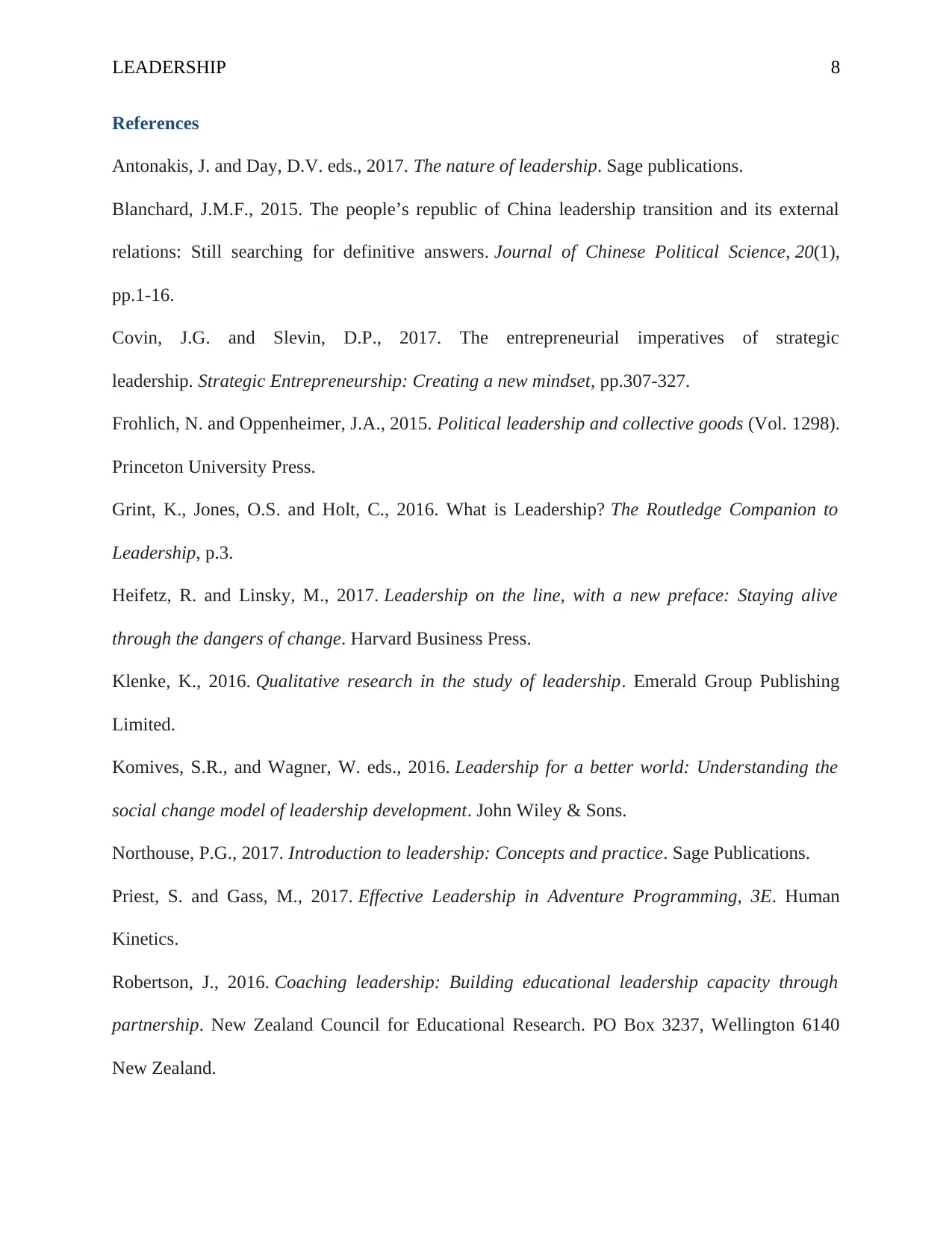
LEADERSHIP 8
References
Antonakis, J. and Day, D.V. eds., 2017. The nature of leadership. Sage publications.
Blanchard, J.M.F., 2015. The people’s republic of China leadership transition and its external
relations: Still searching for definitive answers. Journal of Chinese Political Science, 20(1),
pp.1-16.
Covin, J.G. and Slevin, D.P., 2017. The entrepreneurial imperatives of strategic
leadership. Strategic Entrepreneurship: Creating a new mindset, pp.307-327.
Frohlich, N. and Oppenheimer, J.A., 2015. Political leadership and collective goods (Vol. 1298).
Princeton University Press.
Grint, K., Jones, O.S. and Holt, C., 2016. What is Leadership? The Routledge Companion to
Leadership, p.3.
Heifetz, R. and Linsky, M., 2017. Leadership on the line, with a new preface: Staying alive
through the dangers of change. Harvard Business Press.
Klenke, K., 2016. Qualitative research in the study of leadership. Emerald Group Publishing
Limited.
Komives, S.R., and Wagner, W. eds., 2016. Leadership for a better world: Understanding the
social change model of leadership development. John Wiley & Sons.
Northouse, P.G., 2017. Introduction to leadership: Concepts and practice. Sage Publications.
Priest, S. and Gass, M., 2017. Effective Leadership in Adventure Programming, 3E. Human
Kinetics.
Robertson, J., 2016. Coaching leadership: Building educational leadership capacity through
partnership. New Zealand Council for Educational Research. PO Box 3237, Wellington 6140
New Zealand.
References
Antonakis, J. and Day, D.V. eds., 2017. The nature of leadership. Sage publications.
Blanchard, J.M.F., 2015. The people’s republic of China leadership transition and its external
relations: Still searching for definitive answers. Journal of Chinese Political Science, 20(1),
pp.1-16.
Covin, J.G. and Slevin, D.P., 2017. The entrepreneurial imperatives of strategic
leadership. Strategic Entrepreneurship: Creating a new mindset, pp.307-327.
Frohlich, N. and Oppenheimer, J.A., 2015. Political leadership and collective goods (Vol. 1298).
Princeton University Press.
Grint, K., Jones, O.S. and Holt, C., 2016. What is Leadership? The Routledge Companion to
Leadership, p.3.
Heifetz, R. and Linsky, M., 2017. Leadership on the line, with a new preface: Staying alive
through the dangers of change. Harvard Business Press.
Klenke, K., 2016. Qualitative research in the study of leadership. Emerald Group Publishing
Limited.
Komives, S.R., and Wagner, W. eds., 2016. Leadership for a better world: Understanding the
social change model of leadership development. John Wiley & Sons.
Northouse, P.G., 2017. Introduction to leadership: Concepts and practice. Sage Publications.
Priest, S. and Gass, M., 2017. Effective Leadership in Adventure Programming, 3E. Human
Kinetics.
Robertson, J., 2016. Coaching leadership: Building educational leadership capacity through
partnership. New Zealand Council for Educational Research. PO Box 3237, Wellington 6140
New Zealand.
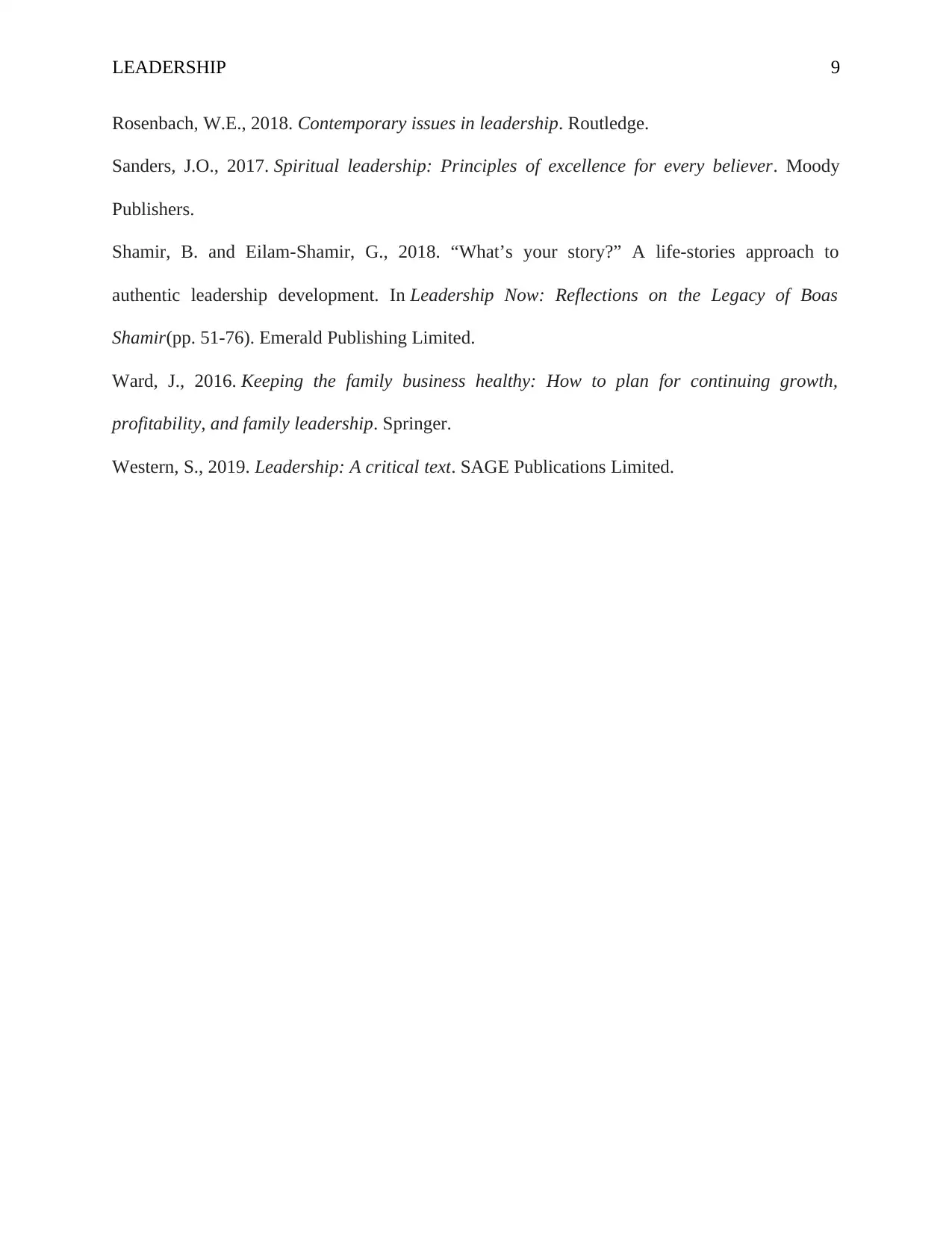
LEADERSHIP 9
Rosenbach, W.E., 2018. Contemporary issues in leadership. Routledge.
Sanders, J.O., 2017. Spiritual leadership: Principles of excellence for every believer. Moody
Publishers.
Shamir, B. and Eilam-Shamir, G., 2018. “What’s your story?” A life-stories approach to
authentic leadership development. In Leadership Now: Reflections on the Legacy of Boas
Shamir(pp. 51-76). Emerald Publishing Limited.
Ward, J., 2016. Keeping the family business healthy: How to plan for continuing growth,
profitability, and family leadership. Springer.
Western, S., 2019. Leadership: A critical text. SAGE Publications Limited.
Rosenbach, W.E., 2018. Contemporary issues in leadership. Routledge.
Sanders, J.O., 2017. Spiritual leadership: Principles of excellence for every believer. Moody
Publishers.
Shamir, B. and Eilam-Shamir, G., 2018. “What’s your story?” A life-stories approach to
authentic leadership development. In Leadership Now: Reflections on the Legacy of Boas
Shamir(pp. 51-76). Emerald Publishing Limited.
Ward, J., 2016. Keeping the family business healthy: How to plan for continuing growth,
profitability, and family leadership. Springer.
Western, S., 2019. Leadership: A critical text. SAGE Publications Limited.
⊘ This is a preview!⊘
Do you want full access?
Subscribe today to unlock all pages.

Trusted by 1+ million students worldwide
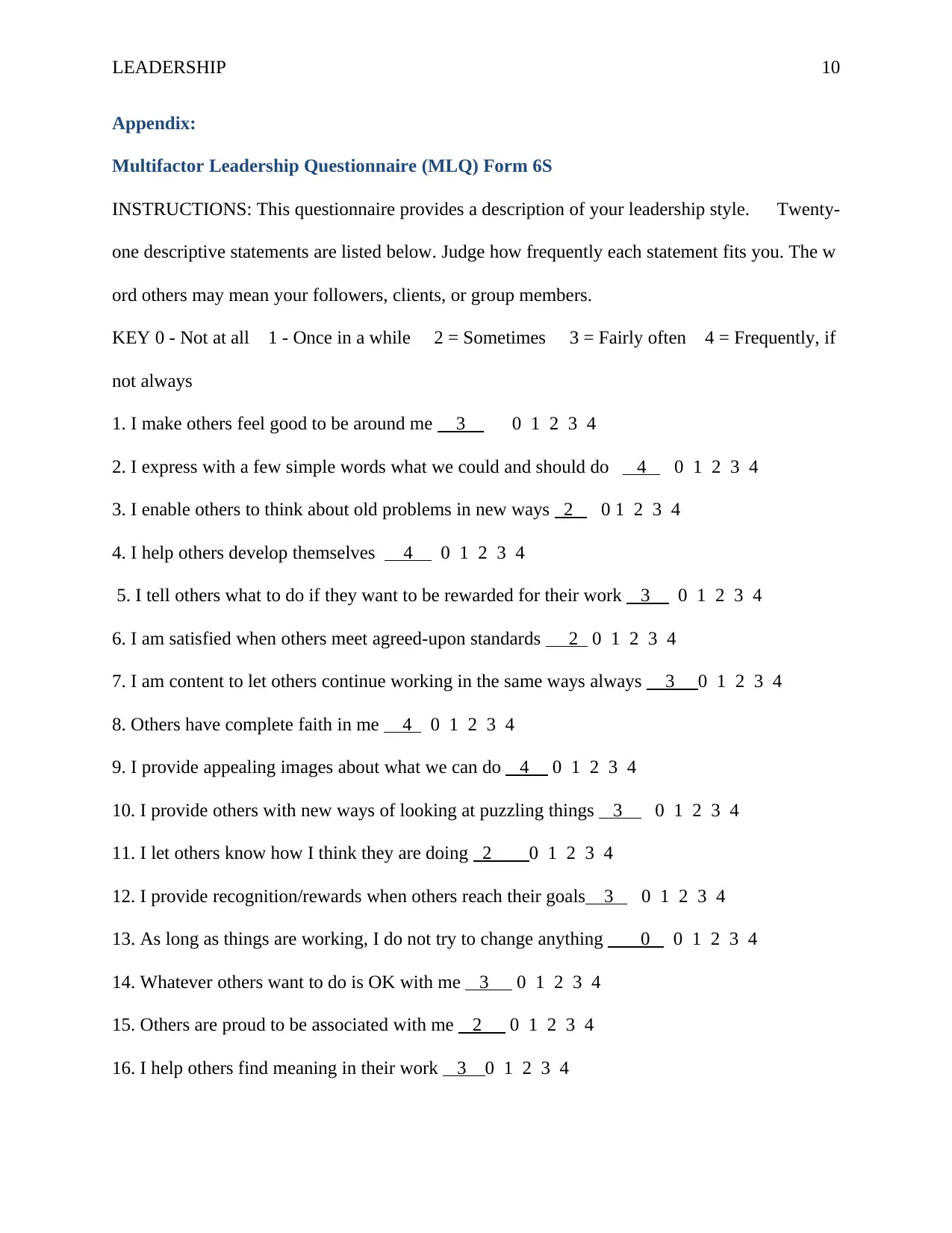
LEADERSHIP 10
Appendix:
Multifactor Leadership Questionnaire (MLQ) Form 6S
INSTRUCTIONS: This questionnaire provides a description of your leadership style. Twenty‐
one descriptive statements are listed below. Judge how frequently each statement fits you. The w
ord others may mean your followers, clients, or group members.
KEY 0 ‐ Not at all 1 ‐ Once in a while 2 = Sometimes 3 = Fairly often 4 = Frequently, if
not always
1. I make others feel good to be around me 3 0 1 2 3 4
2. I express with a few simple words what we could and should do 4 0 1 2 3 4
3. I enable others to think about old problems in new ways 2 0 1 2 3 4
4. I help others develop themselves 4 0 1 2 3 4
5. I tell others what to do if they want to be rewarded for their work 3 0 1 2 3 4
6. I am satisfied when others meet agreed‐upon standards 2 0 1 2 3 4
7. I am content to let others continue working in the same ways always 3 0 1 2 3 4
8. Others have complete faith in me 4 0 1 2 3 4
9. I provide appealing images about what we can do 4 0 1 2 3 4
10. I provide others with new ways of looking at puzzling things 3 0 1 2 3 4
11. I let others know how I think they are doing 2 0 1 2 3 4
12. I provide recognition/rewards when others reach their goals 3 0 1 2 3 4
13. As long as things are working, I do not try to change anything 0 0 1 2 3 4
14. Whatever others want to do is OK with me 3 0 1 2 3 4
15. Others are proud to be associated with me 2 0 1 2 3 4
16. I help others find meaning in their work 3 0 1 2 3 4
Appendix:
Multifactor Leadership Questionnaire (MLQ) Form 6S
INSTRUCTIONS: This questionnaire provides a description of your leadership style. Twenty‐
one descriptive statements are listed below. Judge how frequently each statement fits you. The w
ord others may mean your followers, clients, or group members.
KEY 0 ‐ Not at all 1 ‐ Once in a while 2 = Sometimes 3 = Fairly often 4 = Frequently, if
not always
1. I make others feel good to be around me 3 0 1 2 3 4
2. I express with a few simple words what we could and should do 4 0 1 2 3 4
3. I enable others to think about old problems in new ways 2 0 1 2 3 4
4. I help others develop themselves 4 0 1 2 3 4
5. I tell others what to do if they want to be rewarded for their work 3 0 1 2 3 4
6. I am satisfied when others meet agreed‐upon standards 2 0 1 2 3 4
7. I am content to let others continue working in the same ways always 3 0 1 2 3 4
8. Others have complete faith in me 4 0 1 2 3 4
9. I provide appealing images about what we can do 4 0 1 2 3 4
10. I provide others with new ways of looking at puzzling things 3 0 1 2 3 4
11. I let others know how I think they are doing 2 0 1 2 3 4
12. I provide recognition/rewards when others reach their goals 3 0 1 2 3 4
13. As long as things are working, I do not try to change anything 0 0 1 2 3 4
14. Whatever others want to do is OK with me 3 0 1 2 3 4
15. Others are proud to be associated with me 2 0 1 2 3 4
16. I help others find meaning in their work 3 0 1 2 3 4
Paraphrase This Document
Need a fresh take? Get an instant paraphrase of this document with our AI Paraphraser
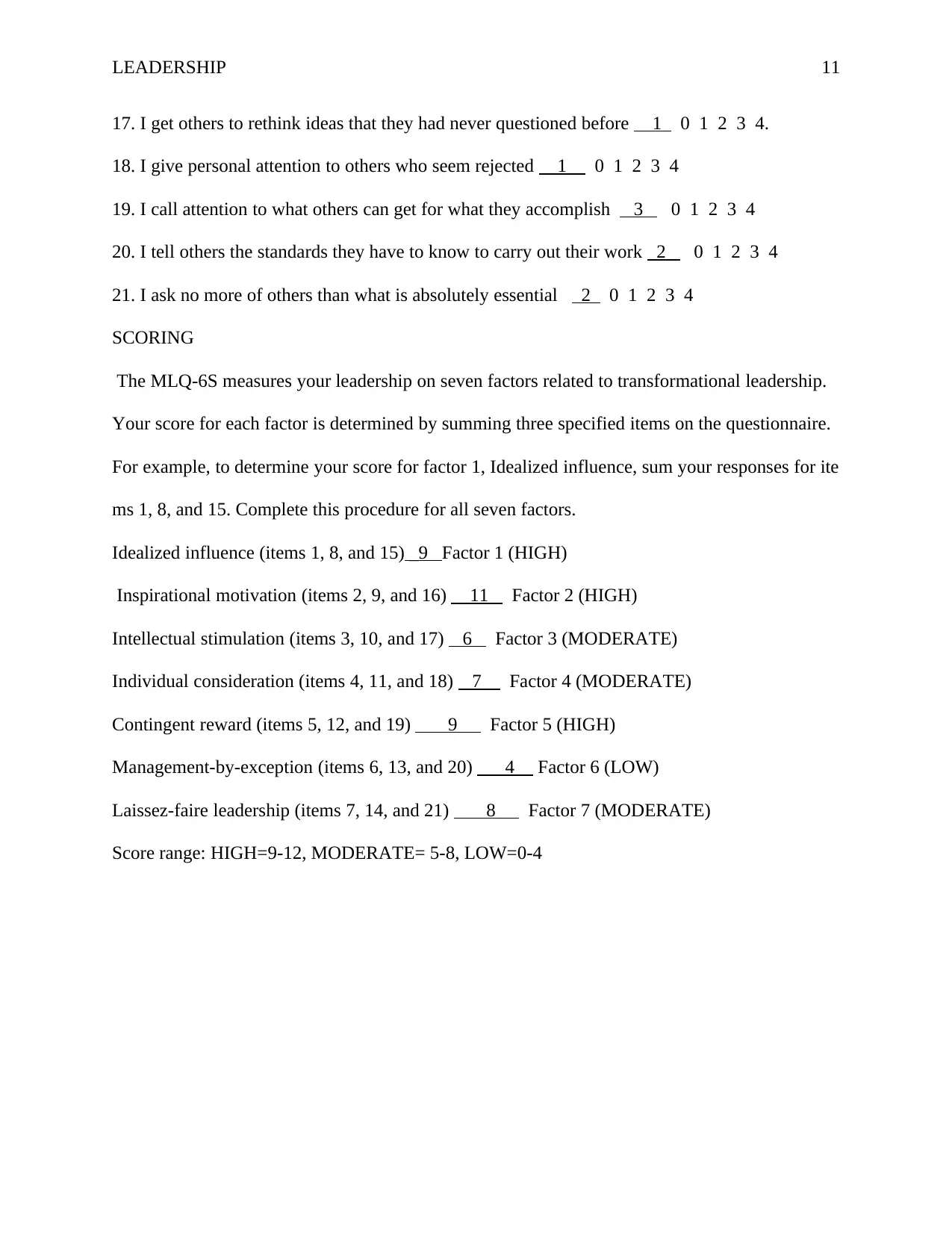
LEADERSHIP 11
17. I get others to rethink ideas that they had never questioned before 1 0 1 2 3 4.
18. I give personal attention to others who seem rejected 1 0 1 2 3 4
19. I call attention to what others can get for what they accomplish 3 0 1 2 3 4
20. I tell others the standards they have to know to carry out their work 2 0 1 2 3 4
21. I ask no more of others than what is absolutely essential 2 0 1 2 3 4
SCORING
The MLQ‐6S measures your leadership on seven factors related to transformational leadership.
Your score for each factor is determined by summing three specified items on the questionnaire.
For example, to determine your score for factor 1, Idealized influence, sum your responses for ite
ms 1, 8, and 15. Complete this procedure for all seven factors.
Idealized influence (items 1, 8, and 15) _9 Factor 1 (HIGH)
Inspirational motivation (items 2, 9, and 16) 11 Factor 2 (HIGH)
Intellectual stimulation (items 3, 10, and 17) 6 Factor 3 (MODERATE)
Individual consideration (items 4, 11, and 18) 7 Factor 4 (MODERATE)
Contingent reward (items 5, 12, and 19) 9 Factor 5 (HIGH)
Management‐by‐exception (items 6, 13, and 20) 4 Factor 6 (LOW)
Laissez‐faire leadership (items 7, 14, and 21) 8 Factor 7 (MODERATE)
Score range: HIGH=9-12, MODERATE= 5-8, LOW=0-4
17. I get others to rethink ideas that they had never questioned before 1 0 1 2 3 4.
18. I give personal attention to others who seem rejected 1 0 1 2 3 4
19. I call attention to what others can get for what they accomplish 3 0 1 2 3 4
20. I tell others the standards they have to know to carry out their work 2 0 1 2 3 4
21. I ask no more of others than what is absolutely essential 2 0 1 2 3 4
SCORING
The MLQ‐6S measures your leadership on seven factors related to transformational leadership.
Your score for each factor is determined by summing three specified items on the questionnaire.
For example, to determine your score for factor 1, Idealized influence, sum your responses for ite
ms 1, 8, and 15. Complete this procedure for all seven factors.
Idealized influence (items 1, 8, and 15) _9 Factor 1 (HIGH)
Inspirational motivation (items 2, 9, and 16) 11 Factor 2 (HIGH)
Intellectual stimulation (items 3, 10, and 17) 6 Factor 3 (MODERATE)
Individual consideration (items 4, 11, and 18) 7 Factor 4 (MODERATE)
Contingent reward (items 5, 12, and 19) 9 Factor 5 (HIGH)
Management‐by‐exception (items 6, 13, and 20) 4 Factor 6 (LOW)
Laissez‐faire leadership (items 7, 14, and 21) 8 Factor 7 (MODERATE)
Score range: HIGH=9-12, MODERATE= 5-8, LOW=0-4
1 out of 11
Related Documents
Your All-in-One AI-Powered Toolkit for Academic Success.
+13062052269
info@desklib.com
Available 24*7 on WhatsApp / Email
![[object Object]](/_next/static/media/star-bottom.7253800d.svg)
Unlock your academic potential
Copyright © 2020–2026 A2Z Services. All Rights Reserved. Developed and managed by ZUCOL.





